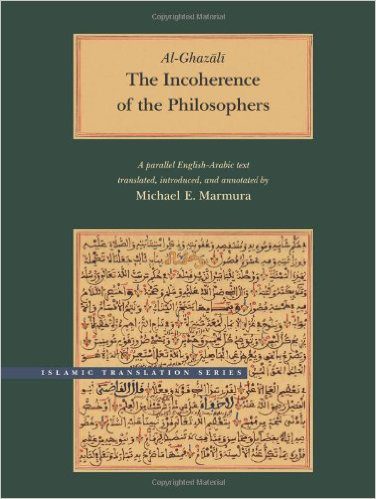
Bill Hamblin and I wrote this column for the 19 October 2013 issue of the Deseret News:
In late 1997, Brigham Young University Press published a new translation (with the original Arabic text on the facing page) of a volume by the 11th-12th century Islamic thinker al-Ghazali. Titled “The Incoherence of the Philosophers,” it ranks among the most important books ever written in the Islamic world.
Many of his faith consider al-Ghazali the second greatest Muslim after the Prophet Muhammad himself. His story is an interesting one with a distinctly modern ring to it.
Al-Ghazali was born within the borders of today’s Iran but spent much of his life in Baghdad, the great capital of the far-flung Islamic empire. Superbly educated, he established himself at a young age among the keenest minds of his time and as a phenomenally popular lecturer on law and theology at the university in Baghdad, the Nizamiyya. What is more, he had the personal interest and patronage of Nizam al-Mulk, the remarkable prime minister of his day, after whom the school had been named.
Yet, he was inwardly unsatisfied. And suddenly he simply couldn’t go on any longer. (His crisis may have been provoked when his patron was murdered by a group known as the “Assassins” — from whom we get that unhappy word.) He gave up teaching, and literally couldn’t speak for a time. His teaching seemed to him to have no real value. Most catastrophically, he began to doubt virtually everything.
Finally, he left Baghdad to try to put his life back together. And, fortunately for us, he eventually also left behind an autobiography titled “The Deliverer from Error,” in which he recounts the path that restored him, in the end, to confidence, faith and conviction.
There were, he records, four basic groups who claimed to provide the religious certainty he craved. The theologians, for example, said that by applying sound interpretive techniques and rigorous logic to the revealed text of the Qur’an, they could lead their followers to indisputable truths.
But al-Ghazali was not convinced. Even if they could prove to him that the Qur’an taught such and such, how did he know that the Qur’an itself was true? And if he was uncertain about that, no interpretation of the Qur’an, no matter how carefully derived, could prove itself absolutely true. A stream cannot rise above its source. A building cannot be more firm than its foundation. Anybody can see that Homer’s “Iliad” says that Zeus is divine, but we non-pagans aren’t obliged to agree. Homer has no particular authority for us.
The same problem nullified the claims of the various groups in his day — the “Assassins” were among them — who said that they had an infallible religious leader and that one had only to follow him in order to be led, infallibly, to absolute truth. How, al-Ghazali asked, could a seeker after certainty know for sure which of the many “infallible” leaders was the real thing? (They all disagreed among themselves.) And if the initial decision was doubtful, nothing depending on it thereafter could be certain.
The philosophers of al-Ghazali’s day, by contrast, claimed that their arguments were so airtight that anyone who really understood them could not doubt that their conclusions were true, just as anyone who understands geometry knows by definition that a circle has 360 degrees and a triangle 180. So al-Ghazali studied them, intensely. This resulted in a book summarizing their ideas titled “The Aims of the Philosophers” — which, translated into Latin, ironically led Europeans to regard “Algazel” himself as a philosopher. But once again, he was not convinced, and his great book “The Incoherence of the Philosophers” explains in detail, using their own logic and methods, why the philosophers too could not deliver the kind of certainty that they promised.
Finally, he turned to the mystics of Islam, the Sufis. Here al-Ghazali found peace of mind. Through his own mystical experience — by personal revelation, one might say — he came to know that revelation was possible, that divine knowledge could be had and that life was meaningful. Such personal experience was, he said, like the sense of taste. A person knows what it is, and that he or she has experienced it, but the experience remains individual, personal and subjective. It cannot really be communicated to others. The believer can point in the correct direction, can explain how he or she came to faith, but, ultimately, seekers of truth and religious certainty must find it for themselves.











